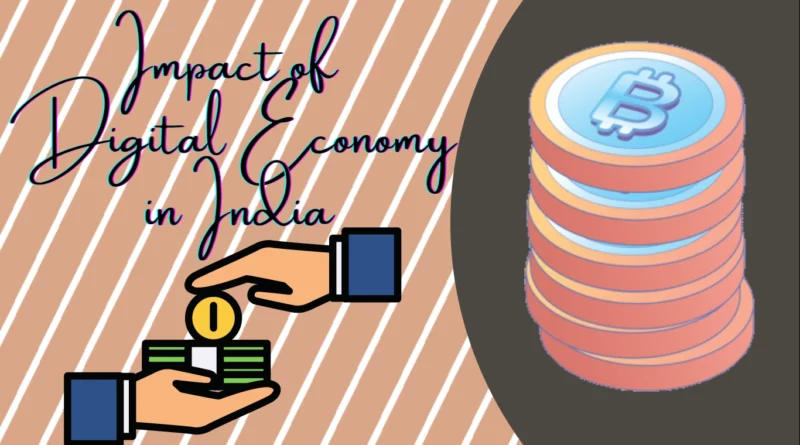Impact of Digital Economy in India – Essay for UPSC
In 2016 Prime Minister Narendra Modi, came up with a demonetization with the goal of checking corruption, black money, and counterfeit currency. Later the goal was shifted toward making India into a digital economy. To spread economic benefits to all sections of society. However, World Development Report published by UNDP, highlights that India has the highest offline population in the world. What is the impact of digital economy in India? Is India ready for the Digital economy? How digital economy can benefit society? What are the threats of the digital economy?
We try our best to provide you with a 1000+ words essay on the Impact of Digital Economy in India. Further, we will discuss the digital economy in India issues and challenges.
Impact of Digital India on Society
The digital economy can be understood as performing economic activities through the internet and Communication Technology. Moreover, the economy basically has four components. Firstly, the sale and purchase of goods and services, utilization of resources, impact on society, and the international sphere. The digital economy provides an avenue for free moments of goods and services across the world, the very principle of capitalism. Thus, an economy like India can produce goods at a lower price by selling to a developed nation like the US, leading to income redistribution.
Even with society, it can lead to an inclusive and equitable society. For instance, tribals of the Bastar region namely “HO”, “Munda”, and others are utilizing the digital platform for selling their goods made with traditional knowledge with a brand of “Bastar Arts”. Similarly, in Papua New Guinea, old age people rather than make them dependent. The public departments also use digital platforms to get advice or share the experiences of retired officials. India has also come up with a similar portal “Anubhav”. Hence, effective utilization of resources within society.
Further, the digital economy transcends Nation state borders and opens new avenues for quality education and healthcare. For instance, Coursera, a web platform provides online courses from top universities like Oxford to different parts of the world. It not only generates economic activity for universities and service providers. But, it has positive externalities in producing quality human resources in the next generation. India has also come up with a similar platform with the name “SWAYAM” to reduce social inequalities in education.

Report on the Impact of Digital Economy in India
Similarly, telemedicine provides a new platform for assessable Healthcare. In the present situation, only the tertiary health sector is utilizing it in India, which earns about 920 crores through medical tourism. However, the government is working to introduce it at the local level.
Not only this but also as per reports, if India shifts completely to the digital economy, then it can save 1 lakh trees from cutting by saving paper per month. As per a World Bank report, on average 4.25 lakh trees are planted in India in a month. Protection of the environment will benefit the coming generation. India along with Japan came up with the Asia-Africa growth corridor through the digital economy. It consists of building cyber-infrastructure in Asia & Africa.
India will provide soft skills, education, and health through it to turn its demographic into human capital. It will benefit both India as well as Africa. Not only boosts the economy in current times but also transcends to the coming generation with better human capital.
Challenges of the Digital Economy
One of the biggest challenges of the digital economy highlighted in the World Development Report of UNDP is the creation of social inequalities. India the fastest growing economy has internet access to only 20 crore people out of 130 crores. In rural India, only 9% of people have internet access. If we talk about high-speed internet it is less than one percent even in urban areas.
At the next level, digital illiteracy is a challenge that further makes inequality between the haves and the haves not. Rather than building social equality, it can pave the way for monopoly in the economy, which is why social inequality. At present, India has only 42 % of people have digital literacy, which is just about doing basic work on a computer or on other ICT devices. Big companies, which have deep pockets are using digital platforms with predatory pricing. For instance, Samsung dealers sell products on Flipkart and Amazon for less than cost making. These monopolistic trends can further disturb the social fabric of society.
Recently, digital currency like Bitcoin came into the picture to boost the digital economy. It has become an avenue for terrorist activities, which is again a threat to a peaceful society. Digital platforms have become a bane rather than a bone. Women trafficking through a digital platform and bidding across borders is growing day by day. CRY(Child Rights and You), a non-government organization, shows its concern in its annual report. Which, with the advent of the digitalization of the economy, child trafficking has increased from 4 children per day in metro cities to 16 children per day (a 400% increase).
The steps were taken toward Digital Economy in India
Apprehension related to trafficking and economic inequalities transcending to social inequalities is a wearing trend. But, we need to understand digitalization or ICT platforms are just a tool. For effective utilization, we need to work towards various measures. For instance, the Government of India plans “Bharat net” to connect all the village panchayats. Similarly, the government introduced free Wi-Fi in public places like Railways to improve internet access. Moreover, World Bank is funding projects across the world to improve internet accessibility.
Further, to empower people, the Government came up with “Adhar Pay” in which people can transact without an internet connection. It will not only boost the economy but also empower the most deprived section of society. In schools, computer education is made compulsory. Further, the “Skill India Program” is also Introduced.
To check monopolies, the government has also come up with a digital India program that not only provides a platform for selling goods and services but also makes farmers aware to improve their productivity.
To further strengthen the digital economy and check the misuse of the Cyber platform, WTO decided on various faults and form a committee with the collaboration of the representatives of different nations. Moreover, digital challenges are bound to come. So, we need to upgrade the capability of security forces to check the misuse of cyber technology. To fight all the corrupt practices and remove them from root and shoot, ethics and morality are panaceas to build a just society. Which is socially inclusive, economically inclusive, and environmentally sustainable. Indeed, the digital economy can benefit society in achieving these goals in the coming future.
Also Read:- Similar Essays for UPSC in 1000+ Words!

